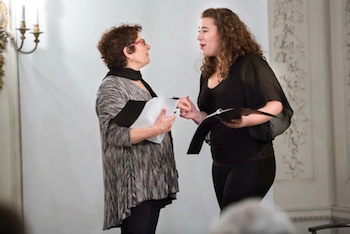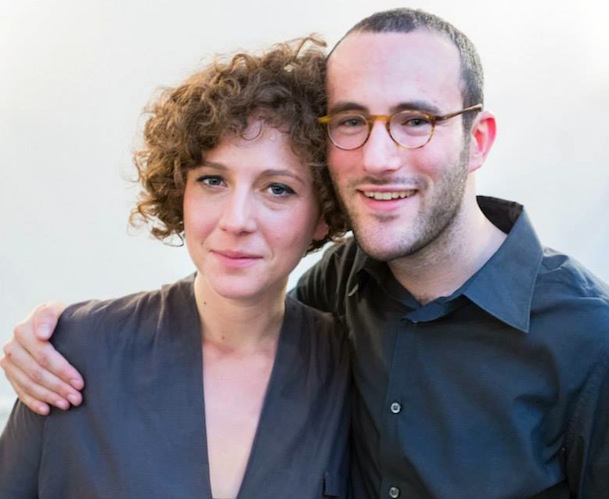Theater Review: “Mameloschn” — Three Jewish Women Living Through the History of Germany
Refreshingly, playwright Marianna Salzmann manages to be political without being didactic. Her characters live (rather than preach) through history, grappling with the transition from totalitarianism to democracy.
By Ian Thal
Mameloschn by Marianna Salzmann. A staged reading directed by Guy Ben-Aharon. Translated from the German by Katy Derbyshire. Presented by German Stage at the Goethe-Institut Boston, MA, on October 27.

Bobbie Steinbach and Rebecca Schneebaum in the German Stage reading of “Mameloschn” Photo: Alena Kuzub.
A year-and-a-half ago, as director Guy Ben-Aharon was preparing to travel to Germany, partly as preparation for German Stage’s first season, and partly for a separate project, he said one of his goals was to discover how the small population of German-Jews have reconciled themselves with their lives there. One answer to that question is proposed by Marianna Salzmann in her new play, Mameloschn, which received its American premiere to a packed audience at the Goethe-Institut in Boston.
Mameloschn is a three-generation story of a Jewish family that made a life in Germany after the Holocaust — in particular in once-communist controlled German Democratic Republic. Playwright Salzmann was born in 1985 in Wolgograd (formerly Stalingrad, formerly Tsaritsyn) in the Soviet Union, and grew up in Moscow before she immigrating to Germany as a child in 1995. Despite her youth, the writer has collected a number of awards in a short period of time, establishing her as a rising talent amongst German playwrights.
The figure of Lin (Bobbie Steinbach) is inspired by, but not meant to be a portrait of, Lin Jaldati (1912-1988), the Dutch-born Holocaust survivor and interpreter of Yiddish songs, a dedicated communist who moved to East Germany after surviving the camps. Reluctant to move to the desert, she hoped to help build an anti-fascist state in the center of Europe, one that would even reeducate Germans. The fictional Lin’s role, modeled on the career of her historical counterpart, is the preservation of the memory of the Jewish victims of the Holocaust through public performances of Yiddish folk-songs. Salzmann’s Lin is young enough to have lived to see the fall of the Berlin Wall and the first decades of the 21st century. The character is not religiously devout, though she is still a Jew. She has visited Israel’s Yad Vashem and nostalgically hungers for such Ashkenazi comfort food as kreplach and bialys. She also maintains the Yom Kippur fast and teaches her granddaughter, Rahel (Rebecca Schneebaum), liturgical songs such as Shalom Alechem (“Peace be with you” likely also a deliberate pun on Salzmann’s part on the penname of the famed Yiddish writer).
Rahel, too young to remember Germany before its reunification, uses “Stasi,” the name of the East German secret police and foreign intelligence agency, as an epithet, much in the way that less historically aware Americans use terms like “fascist” and “nazi.” She causes her mother a considerable amount of anxiety, because of her desire to learn Yiddish, to pursue graduate studies in America, and to live in Lower Eastside Manhattan. (Salzmann’s expert attention to historic and geographical detail informs the play’s the poetry, though her research falters here. It is highly unlikely that a graduate student could afford a sublet in 21st-century Saint Mark’s Place.)
In contrast, Clara (Maureen Keiller), Lin’s daughter and Rahel’s mother, resents her mother because of the fame she garnered under the communist regime (as well as her Jewish celebrity), which provided Lin with privileges that Clara now sees as unfair. Clara wishes she could assimilate and simply be a normal German. She wishes her mother would neither identify as a survivor nor as a communist, and wishes her children were content to stay in Germany and assimilate. Clara’s concerns are not unfounded: When, at Rahel’s age, she went to France as a student. She returned pregnant with twins. More recently, her son, David, broke off contact after making aliyah in Israel, and may have even taken a new name.
The story is told non-linearly, alternating between scenes showing the three women living under the same roof (or later, once Rahel leaves for Manhattan, the two older women) and monologues: Rahel’s letters describe New York to her twin who has stopped writing back; Clara sends frantic emails to a daughter who goes incommunicado during the 2011 earthquake in Virginia, which was felt as far north as New England, and is unheard from again when Hurricane Sandy strikes New Jersey in 2012; and Lin chronicles her accounts of what were for her the key historical events of East German history — perhaps providing fodder for her memoirs.
Lin, looking back on her life, expresses no regrets for the values that guided her decisions, even if (much like some of the characters in Tony Kushner’s Slavs!) she must concede that the anti-fascist state she served did not live up to its stated principles, and that, despite what many apologists would claim, many socialists were virulent anti-Semites. She recalls the 1953 purges of “Titoists, Zionists, and Trotskyites,” the latter two labels serving as code-words for “Jew.” In another entry she recalls the government demanding that she, as a Jewish celebrity, condemn Israel as the aggressor during the 1973 Yom Kippur War. Her decisive disillusionment with the socialist enterprise comes when she hears the heartfelt pro-Hitler chants of the East Germans who are demanding the Berlin Wall be torn down.
Refreshingly, Salzmann manages to be political without being didactic. Her characters live (rather than preach) through history, grappling with the transition from totalitarianism to democracy. Their stories shape a complex vision of Jewish identity, whether it is how Jews routinely changed their names as they moved from one country to another (Salzmann mentioned during the talk back that — as a Russian-born Jew immigrant to Germany — she has had several), to the way a regime speaks about Jews when it wishes to deny its anti-Semitism. Mameloschn explores the distinction between Disapora Jews and Israelis, the sardonic pan-Ashkenazi sense of humor, the way Jews remain Jews, even as they adapt to the characteristics of the countries where they live and rules set by the regimes they live under. Most intimately, Mameloschn examines the ramifications of lack of privacy in the former eastern bloc and its presence in the democratic west.
The world the women inhabit is a complex one of various languages, conveyed not just in the jokes Salzmann’s characters share, but in the playwright’s creative puns and allusions. During a Yiddish lesson between Rahel and Lin, the Hebrew loanword baal, which means a person, or more specifically, one who posesses a quality (as in the honorific assigned to Yisroel ben Eliezer, the founder of the Hassidic movement, Baal Shem Tov) is also noted to be a god worshiped by the Hebrews’ Cannanite neighbors. That leads Rahel to ask if Brecht was anti-Semitic — what was left unsaid is that Brecht’s first play was titled Baal. The very Jewish answer to that impertinent question is that socialists are not supposed to be anti-Semitic.
Despite the fact that the cast was still on-book, the quality of the script and the actors’ talents made for a compelling evening of drama. Schneebaum conveyed Rahel’s openess to the world: the character experiences a new city and new languages while struggling with establishing a comfortable connection with her family and her environment. Keiller elicited Clara’s understandable desires for nondescript normality in the midst of a traumatic history. The play offers multifaceted roles for Keiller and Schneebaum, but it served as a powerful showcase for Bobbie Steinbach. As Lin, Steinbach’s formidable intelligence and comic skills made her the ideal actress to play the eccentric matriarch of the family, a woman who maintains her moral authority as she balances thorny domestic, ethnic, and political commitments.
Eavesdropping at the reception after the reading, I heard several people note that Americans generally lack curiosity about plays by foreign playwrights. German drama is solely represented here by Brecht and Weill; while only a few enthusiasts are familiar with the work of Heiner Müller. This is a real loss, because, as with Theresia Walser, Salzmann is a German playwright that our theatre artists and audiences should know better.
Ian Thal is a performer and theatre educator specializing in mime, commedia dell’arte, and puppetry, and has been known to act on Boston area stages from time to time, sometimes with Teatro delle Maschere, and on occasion served on productions as a puppetry choreographer or dramaturg. He has performed his one-man show, Arlecchino Am Ravenous, in numerous venues in Massachusetts and Rhode Island, and is currently working on his second full length play; his first, though as-of-yet unproduced, was picketed by a Hamas supporter during a staged reading. Formally the community editor at The Jewish Advocate, he blogs irregularly at the unimaginatively entitled From The Journals of Ian Thal, and writes the “Nothing But Trouble” column for The Clyde Fitch Report.
Tagged: Bobbie Steinbach, Guy Ben-Aharon, Lin Jaldati, Mameloschn, Marianna Salzmann, german

